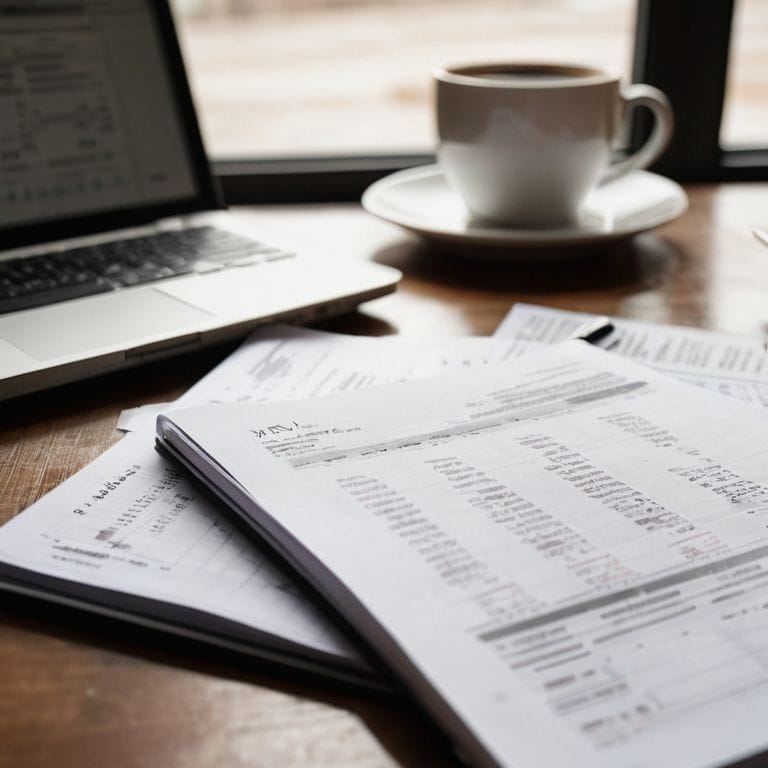I still remember the day I realized I had no idea how to create a budget that actually worked for me. I was drowning in debt, and the thought of making a budget felt like just another daunting task. But here’s the truth: creating a budget isn’t about restricting yourself or following some complicated formula – it’s about taking control of your finances and making conscious decisions about where your money goes. I learned this the hard way, through trial and error, and it completely changed my financial life.
In this article, I’ll share my simple, no-BS guide on how to create a budget that actually works. I’ll walk you through the exact steps I took to get out of debt and start building wealth. You’ll learn how to track your expenses, set realistic financial goals, and make a budget that aligns with your values. My goal is to provide you with practical, actionable advice that you can start using today. I’m not a financial expert, just a regular person who’s been in your shoes and wants to help you achieve financial freedom. So, let’s get started and take the first step towards creating a budget that will change your life.
Table of Contents
Guide Overview: What You'll Need

Total Time: 1 hour 30 minutes
Estimated Cost: $0 – $10
Difficulty Level: Easy
Tools Required
- Pencil (for writing)
- Calculator (for basic math operations)
Supplies & Materials
- Paper (for note-taking)
- Pen (for writing)
- Envelope or Folder (for organizing receipts)
- Spreadsheet Software (optional)
Step-by-Step Instructions
- 1. First, gather all your financial documents in one place, including pay stubs, bills, credit card statements, and any other regular expenses. This will give you a clear picture of where your money is coming from and where it’s going. I like to make a big spreadsheet to track everything, but you can use a budgeting app or even just a notebook if that’s more your style.
- 2. Next, calculate your net income, which is the amount of money you have available to spend each month after taxes and other deductions. This will be the foundation of your budget, so make sure you get it right. Don’t forget to include any irregular income, like freelance work or bonuses, and try to estimate how much you can count on receiving each month.
- 3. Now it’s time to categorize your expenses into needs, wants, and debt repayment. Needs include essential expenses like rent, utilities, and food, while wants are discretionary spending like dining out or entertainment. Debt repayment is exactly what it sounds like: any money you’re putting towards paying off loans or credit cards. Be honest with yourself about which category each expense falls into.
- 4. The next step is to set financial goals for yourself, both short-term and long-term. What do you want to achieve with your budget? Are you trying to pay off debt, build up your savings, or save for a big purchase? Having clear goals in mind will help you make decisions about how to allocate your money. For me, the goal was to pay off $30,000 in debt, and having that specific target in mind really motivated me to stick to my budget.
- 5. With your goals in mind, it’s time to assign dollar amounts to each category in your budget. Start with your needs, making sure you have enough money set aside for essential expenses. Then, allocate money towards your wants and debt repayment. Remember, this is a flexible process, and you may need to make adjustments as you go along. The key is to find a balance that works for you and helps you achieve your goals.
- 6. One of the most important steps in creating a budget is to track your spending. For one month, write down every single transaction you make, no matter how small. This will help you identify areas where you can cut back and make adjustments to your budget. I like to use a budgeting app for this, but you can also use a spreadsheet or just keep a notebook. The key is to be consistent and honest with yourself.
- 7. Finally, review and revise your budget regularly. I like to schedule a weekly “money date” with myself to review my finances and make any necessary adjustments. This helps me stay on track and make sure I’m still on pace to meet my financial goals. Don’t be too hard on yourself if you slip up – the key is to learn from your mistakes and keep moving forward.
My Budget Freedom Plan

As I reflect on my journey to financial freedom, I realize that monthly expense tracking was a game-changer for me. It allowed me to understand where my money was going and make informed decisions about my spending. I started by tracking every single transaction, no matter how small, in a spreadsheet. This habit helped me identify areas where I could cut back and allocate that money towards more important things.
For budgeting for beginners, I always recommend starting small. Don’t try to overhaul your entire financial system at once. Instead, focus on making one or two changes at a time. This could be as simple as prioritizing needs over wants or automating budget payments. By taking it one step at a time, you’ll be more likely to stick to your plan and make progress towards your financial goals.
One of the most important lessons I’ve learned is the importance of avoiding debt traps. This means being mindful of high-interest loans and credit cards, and making a plan to pay them off as quickly as possible. By doing so, you’ll free up more money in your budget to focus on building wealth, such as creating an emergency fund. Remember, financial freedom is a marathon, not a sprint. Stay focused, stay disciplined, and you’ll be on your way to achieving your financial goals.
Avoiding Debt Traps With Automation
Automation has been a game-changer for me in avoiding debt traps. By setting up automatic transfers for my bills and savings, I’ve ensured that I never miss a payment. I’ve also automated my debt repayments, which has helped me stay on track and avoid late fees. This simple step has given me peace of mind and freed up mental energy to focus on other areas of my finances.
I’ve taken it a step further by automating my subscription services, such as streaming platforms and software, to review and cancel any unused services. This has helped me avoid unnecessary expenses and stay within my budget. By automating these tasks, I’ve been able to avoid debt traps and make steady progress towards financial freedom.
Tracking Monthly Expenses Made Easy
Tracking Monthly Expenses Made Easy
I’ve found that monitoring where my money goes is crucial. I use a simple spreadsheet to log every transaction, making it easy to identify areas for improvement. This habit has been a game-changer in staying on top of my finances.
By doing this, I can quickly see if I’m overspending in certain categories and make adjustments as needed. It’s amazing how much of a difference this small step can make in achieving financial freedom. I’ve even set up automated reminders to review my expenses weekly, ensuring I stay on track and make progress towards my goals.
5 Budgeting Hacks I Wish I Knew Earlier
- Start by tracking every single transaction for a month to get a real picture of where your money is going
- Prioritize needs over wants, and be honest with yourself about which category each expense falls into
- Use the 50/30/20 rule as a guideline to allocate your income towards necessities, discretionary spending, and saving/investing
- Automate your savings and bill payments to make sure you never miss a payment or fall behind on your goals
- Review and adjust your budget regularly – I like to do it weekly, but at least monthly – to stay on track and make adjustments as your financial situation changes
Key Takeaways for Budgeting Success
Create a realistic budget that accounts for all monthly expenses, and regularly review it to ensure you’re on track to meet your financial goals
Automate your savings and bill payments to avoid debt traps and build a safety net, using tools like direct deposit and automatic transfers
Track your progress and stay motivated by scheduling weekly ‘money dates’ to review your finances, identify areas for improvement, and celebrate your successes along the way
Budgeting Wisdom
Creating a budget isn’t about restricting yourself, it’s about redirecting your money towards the life you truly want – and that’s a incredibly powerful feeling.
Alex Barnes
Taking Control of Your Finances

Creating a budget is a journey, not a destination. As I’ve shared my own story, from being drowning in debt to finding financial freedom, the key steps have remained the same: tracking your expenses, automating your savings, and regularly reviewing your budget. My Budget Freedom Plan has been instrumental in this process, teaching me the importance of tracking monthly expenses and avoiding debt traps with automation. By following these simple, yet powerful steps, you can begin to build a financial foundation that will serve you for years to come.
As you embark on this journey, remember that financial freedom is achievable for everyone, not just the wealthy. It’s about making small, sustainable changes to your daily habits and being consistent. Don’t be too hard on yourself when you slip up – instead, learn from your mistakes and keep moving forward. With persistence and patience, you can break free from the cycle of debt and build a brighter financial future. So, take a deep breath, stay committed, and watch your financial life transform over time.
Frequently Asked Questions
What are some common budgeting mistakes I should avoid to ensure I'm making the most of my money?
I’ve been there – I used to make mistakes like not accounting for irregular expenses or being too strict with my budget. Now, I avoid those pitfalls by prioritizing flexibility and automation. My top tip: don’t forget to review and adjust your budget regularly, and avoid lifestyle inflation by directing excess funds towards savings and debt repayment.
How often should I review and adjust my budget to reflect changes in my income or expenses?
I review my budget weekly, but I recommend checking in at least monthly to reflect changes in income or expenses. This ‘money date’ helps me stay on track and make adjustments as needed – it’s a game-changer for staying financially flexible and avoiding surprises.
Are there any budgeting apps or tools that you recommend for making it easier to track my spending and stay on top of my finances?
I swear by my custom spreadsheet, but I also recommend apps like Mint or You Need a Budget (YNAB) for simplicity and ease of use. They connect to your accounts, track spending, and offer budgeting guidance – a total game-changer for staying on top of your finances!














